#Anglo-african
Text
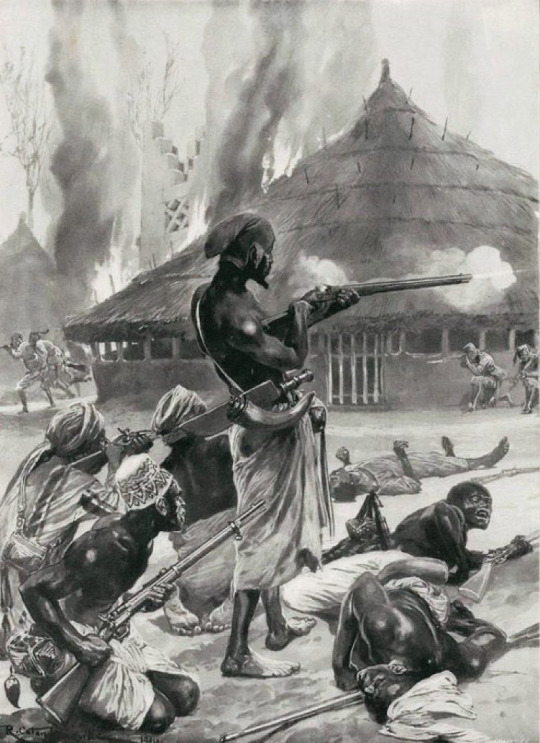
Aro Confederacy
The Aro Confederacy (1690–1902) was a political union orchestrated by the Aro people, Igbo subgroup, centered in Arochukwu in present-day southeastern Nigeria. The Aro Confederacy kingdom was founded after the beginning of the Aro-Ibibio Wars. Their influence and presence was all over Eastern Nigeria, lower Middle Belt, and parts of present-day Cameroon and Equatorial Guinea during the 18th and 19th centuries. The Arochukwu Kingdom was an economic, political, and an oracular center as it was home of the Ibini Ukpabi oracle, High Priests, the Aro King Eze Aro, and central council (Okpankpo). The Aro Confederacy was a powerful and influential political and economic alliance of various Igbo-speaking communities in southeastern Nigeria. It emerged during the 17th century and played a significant role in the region until the late 19th century.
The exact origins of the Aro Confederacy are not precisely documented, but it is believed to have been established around the mid-17th century. The Aro people, who were part of the Igbo ethnic group, inhabited the region around present-day Arochukwu in Abia State, Nigeria. They were skilled traders and missionaries who played a pivotal role in connecting various Igbo communities. This migration and their military power, and wars with neighboring kingdoms like supported by their alliances with several related neighboring Igbo and eastern Cross River militarized states (particularly Ohafia, Edda, Abam, Abiriba, Afikpo, Ekoi, Bahumono, Amasiri etc.), quickly established the Aro Confederacy as a regional economic power. The Aro Confederacy's strength came from its well-organized network of Aro agents who were dispersed across different communities in the region. These agents acted as intermediaries in trade, diplomacy, and religious matters. They facilitated commerce, resolved disputes, and spread the worship of the Aro deity known as the "Long Juju" oracle."The Opening Up of Nigeria, the Expedition Against the Aros by Richard Caton Woodville II" 1901
The "Long Juju" oracle was the spiritual centerpiece of the Aro Confederacy. It was housed in Arochukwu and considered a potent source of political authority and religious guidance. The Aro people used the oracle to enforce their influence and control over surrounding communities. It also served as a means to administer justice and settle disputes, often attracting pilgrims seeking solutions to their problems.
The Aro Confederacy gained significant economic power through trade and commerce Their economy was primarily based on agriculture, with the cultivation of crops like palm oil, yams, and cassava. They were also involved in trade with neighboring communities and European merchants. They controlled trade routes that passed through their territories, collecting tolls and taxes from traders. The Aro also engaged in the Trans-Atlantic slave trade by capturing and selling slaves to European traders.
Aro activities on the coast helped the growth of city-states in the Niger Delta, and these city states became important centres for the export of palm oil and slaves. Such city-states included Opobo, Bonny, Nembe, Calabar, as well as other slave trading city-states controlled by the Ijaw, Efik, and Igbo. The Aros formed a strong trading network, colonies, and incorporated hundreds of communities that formed into powerful kingdoms. The Ajalli, Arondizuogu, Ndikelionwu, and Igbene Kingdoms were some of the most powerful Aro states in the Confederacy after Arochukwu. Some were founded and named after commanders and chiefs like Izuogu Mgbokpo and Iheme who led Aro/Abam forces to conquer Ikpa Ora and founded Arondizuogu. Later Aro commanders such as Okoro Idozuka (also of Arondizuogu) expanded the state's borders through warfare at the start of the 19th century. Aro migrations also played a large role in the expansion of Ozizza, Afikpo, Amasiri, Izombe, and many other city-states. For example, Aro soldiers founded at least three villages in Ozizza. The Aro Confederacy's power, however, derived mostly from its economic and religious position. With European colonists on their way at the end of the 19th century, things changed.Burning of Arochukwu 1901
During the 1890s, the Royal Niger Company of Britain bore friction with the Aros because of their economic dominance. The Aro resisted British penetration in the hinterland because their economic and religious influence was being threatened. The Aro and their allies launched offensives against British allies in Igboland and Ibibioland. After failed negotiations, the British attempted to conquer the Aro Confederacy in 1899. By 1901, the tensions were especially intensified when British prepared for the Aro Expedition. The invasion of Obegu (in Igboland) was the last major Aro offensive before the start of the Anglo-Aro War. In November 1901, the British launched the Aro Expedition and after strong Aro resistance, Arochukwu was captured on December 28, 1901. By early 1902, the war was over, and the Aro Confederacy collapsed. Contrary to the belief that the Ibini Ukpabi was destroyed, the shrine still exists, and is intact in Arochukwu and serves mainly as a tourist site.

#african#afrakan#kemetic dreams#africans#afrakans#brown skin#brownskin#african culture#afrakan spirituality#arochukwu#anglo aro war#obegu#igboland#ibibioland#igbo#igbo culture#british#long juju#aro confederacy#confederacy#nigerian#cameroon
26 notes
·
View notes
Text
today on the accent game, a client was like "oh! i love your accent! are you scottish?" like my dude, my love. dearest. darling. have you ever heard a scottish person speak in your life
#it's not like i don't have my nationality in my bio either#it is - and i cannot stress this enough - the most neutral anglo south african accent you've ever heard#scottish???#i need to be financially compensated for this at this point#diary
10 notes
·
View notes
Text
Yaa Asantewaa was a good example of another ruler in the Sakouri Toure fashion:
This woman was the leader of the so-called War of the Golden Stool, or Fourth Anglo-Ashanti War and the final one of the four. She organized her people around the sacred symbol of the Ashanti Kingdom and they had enough power to swoop down on a British fortification and destroy it and kill all the soldiers in it. The British Empire refused to accept this, especially in the middle of the Boer War, and brought its own wolves on the fold and with them the final destruction of the Ashanti Kingdom and consolidation of British imperial rule in this part of West Africa.
#lightdancer comments on history#black history month#military history#african history#anglo ashanti wars#yaa asantewaa
0 notes
Text
The planned Boer invasion of Rhodesia
What! Smoking your socks again Mr Dickens! Well, here’s some really inconvenient hidden history, the ZAR Republic (Transvaal) planned to invade Southern Rhodesia, amassed thousands of their troops on the Limpopo River border in 1891, and when they sent in an advance party, the incursion into British territory was challenged by Starr Jameson and The British South African Police and the Boer…
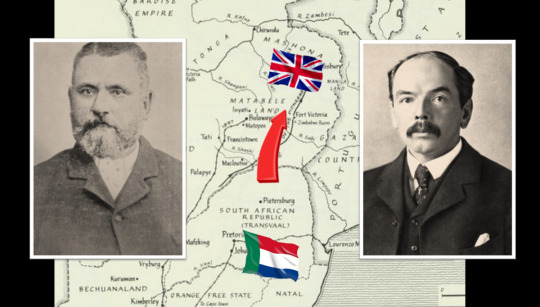
View On WordPress
#2nd Anglo Boer War#Cecil John Rhodes#Chief Lobengula#Jameson Raid#Kruger#Matabele Revolt#Paul Kruger#Rhodes#Starr Jameson#The South African War#The South African War 1899 - 1902#ZAR
0 notes
Text
The Hall Handbook of the Anglo-Boer War :: Darrell Hall, Fransjohan Pretorius & Gilbert Torlage

View On WordPress
#0-8698-0949-0#african prisons#anglo boer war#boer republics#books by darrell hall#british africa#british army#british military#colonialism#concentration camp#concentration camps#fransjohan pretorius & gilbert torlage#guerrilla warfare#history boer war#ladysmith#long toms#military history#naval history#pretoria forts#prisoner war#prisoners#regimental history#royal artillery batteries#royal navy campaigns#south african history#south african war#weaponry
1 note
·
View note
Note
can u elaborate on posture being a lie
As Beth Linker explains in her book “Slouch: Posture Panic in Modern America” (Princeton), a long history of anxiety about the proximity between human and bestial nature has played out in this area of social science. Linker, a historian of medicine at the University of Pennsylvania, argues that at the onset of the twentieth century the United States became gripped by what she characterizes as a poor-posture epidemic: a widespread social contagion of slumping that could, it was feared, have deleterious effects not just upon individual health but also upon the body politic. Sitting up straight would help remedy all kinds of failings, physical and moral [...] she sees the “past and present worries concerning posture as part of an enduring concern about so-called ‘diseases of civilization’ ”—grounded in a mythology of human ancestry that posits the hunter-gatherer as an ideal from which we have fallen.
[...]
In America at the turn of the twentieth century, anxieties about posture inevitably collided with anxieties not just about class but also about race. Stooping was associated with poverty and with manual, industrialized labor—the conditions of working-class immigrants from European countries who, in their physical debasement, were positioned well below the white Anglo-Saxon Protestant establishment. Linker argues that, in this environment, “posture served as a marker of social status similar to skin color.” At the same time, populations that had been colonized and enslaved were held up as posture paradigms for the élite to emulate: the American Posture League rewarded successful students with congratulatory pins that featured an image of an extremely upright Lenape man. The head-carrying customs associated with African women were also adopted as training exercises for white girls of privilege, although Linker notes that Bancroft and her peers recommended that young ladies learn to balance not baskets and basins, which signified functionality, but piles of flat, slippery books, markers of their own access to leisure and education. For Black Americans, posture was even more fraught: despite the admiration granted to the posture of African women bearing loads atop their heads, community leaders like Dr. Algernon Jackson, who helped establish the National Negro Health Movement, criticized those Black youth who “too often slump along, stoop-shouldered and walk with a careless, lazy sort of dragging gait.” If slouching among privileged white Americans could indicate an enviable carelessness, it was seen as proof of indolence when adopted by the disadvantaged.
This being America, posture panic was swiftly commercialized, with a range of products marketed to appeal to the eighty per cent of the population whose carriage had been deemed inadequate by posture surveys. The footwear industry drafted orthopedic surgeons to consult on the design of shoes that would lessen foot and back pain without the stigma of corrective footwear: one brand, Trupedic, advertised itself as “a real anatomical shoe without the freak-show look.” The indefatigable Jessie Bancroft trained her sights on children’s clothing, endorsing a company that created a “Right-Posture” jacket, whose trim cut across the upper shoulders gave its schoolboy wearer little choice but to throw his shoulders back like Jordan Baker. Bancroft’s American Posture League endorsed girdles and corsets for women; similar garments were also adopted by men, who, by the early nineteen-fifties, were purchasing abdominal “bracers” by the millions.
It was in this era that what eventually proved to be the most contentious form of posture policing reached its height, when students entering college were required to submit to mandatory posture examinations, including the taking of nude or semi-nude photographs. For decades, incoming students had been evaluated for conditions such as scoliosis by means of a medical exam, which came to incorporate photography to create a visual record. Linker writes that for many male students, particularly those who had military training, undressing for the camera was no biggie. For female students, it was often a more disquieting undertaking. Sylvia Plath, who endured it in 1950, drew upon the experience in “The Bell Jar,” whose protagonist, Esther Greenwood, discovers that undressing for her boyfriend is as uncomfortably exposing as “knowing . . . that a picture of you stark naked, both full view and side view, is going into the college gym files.” The practice of taking posture photographs was gradually abandoned by colleges, thanks in part to the rise of the women’s movement, which gave coeds a new language with which to express their discomfort. It might have been largely forgotten were it not for a 1995 article in the Times Magazine, which raised the alarming possibility that there still existed stashes of nude photographs of famous former students of the Ivy League and the Seven Sisters, such as George H. W. Bush, Bob Woodward, Meryl Streep, and Hillary Clinton. Many of the photographs in question were taken and held not by the institutions themselves but by the mid-century psychologist William Herbert Sheldon. Sheldon was best known for his later discredited theories of somatotypes, whereby he attributed personality characteristics to individuals based on whether their build was ectomorphic, endomorphic, or mesomorphic.
[...]
Today, the descendants of Jessie Bancroft are figures like Esther Gokhale, a Bay Area acupuncturist and the creator of the Gokhale Method, who teaches “primal posture” courses to tech executives and whose recommendations are consonant with other fitness trends, such as barefoot running and “paleo” eating, that romanticize an ancestral past as a remedy for the ills of the present. The compulsory mass surveillance that ended when universities ceased the practice of posture photography has been replaced by voluntary individual surveillance, with the likes of Rafi the giraffe and the Nekoze cat monitoring a user’s vulnerability to “tech neck,” a newly named complaint brought on by excessive use of the kind of devices profitably developed by those paleo-eating, barefoot-running, yoga-practicing executives. Meanwhile, Linker reports, paleoanthropologists quietly working in places other than TikTok have begun to revise the popular idea that our ancient ancestors did not get aches and pains in their backs. Analysis of fossilized spines has revealed degenerative changes suggesting that “the first upright hominids to roam the earth likely experienced back pain, or would have been predisposed to such a condition if they had lived long enough.” Slouching, far from being a disease of civilization, then, seems to be something we’ve been prone to for as long as we have stood on our own two feet.
854 notes
·
View notes
Text
Anglo American (Kumba Iron Ore) Mining Learnerships 2023 | How to Apply
Anglo American (Kumba Iron Ore) Mining Learnerships 2023 | How to Apply
Anglo American (Kumba Iron Ore) invites South African unemployed graduates to apply for Mining Learnership Programme 2023.
If you reside in the JTG District we have a great opportunity for you to join our extraordinary team at Sishen Mine and discover all about surface mining and mobile equipment in an eighteen-month Mining Learnership enrichment programme. You are required to be fit to…

View On WordPress
#Anglo American (Kumba Iron Ore) Mining Learnerships#Anglo American (Kumba Iron Ore) Mining Learnerships 2023/2024#Khathu#Northern Cape#South African
0 notes
Text
I think it's weird how people on here seem determined to argue about how american black people are better off somehow for living in the imperial core because you are fundamentally making an argument on "privilege" whether you use those words or not and at this point we can acknowledge that is an awful system for analysing anything. Not only that but you're using it to make an insane moralistic judgement on people living in America which is especially insane when it's about black people and on top of THAT is a deeply stupid and genuinely fascistic manner of "third worldism". Yes black americans earn comparatively higher wages and larger assets than most places in the world but literally no one would argue about that, what's weird is the people who insist on bringing that up neglect the other essential part of this discussion which is that even in African nations where the wages are vastly lower, those people still exist as full citizens of their nation-states, where black people in america are forced (FORCED) to live in the midst of anglo white supremacy that both fundamentally requires and deeply despises their very existence. I'm sorry but I don't even understand what you gain from nearly weaponizing the basic facts of economic imperialism against the most systematically exploited people of the imperial core especially if you claim to be a leftist. Black americans have always had and continue to have the most revolutionary potential within the american empire and instead of even pretending to care about international proletarianism you people will degenerate into radlibs just to make pointless and vaguely racist arguments at black people online.
621 notes
·
View notes
Text
Wolf Moon - January 24-25, 2024
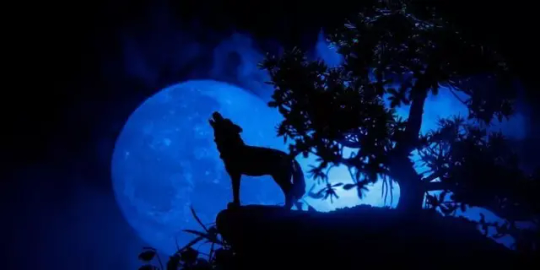
Shake off the cold and sing to the sky, witches - it's time for the Wolf Moon!
Wolf Moon
The Wolf Moon is the name given to the full moon which occurs in the month of January. The name is said to be derived from the sound of wolves howling with hunger while prey is scarce in the midst of winter. Given that we now know that wolves howl mostly for communication, my personal opinion is that people huddled in their homes during a very dark and dangerous time of year probably noticed these sounds a lot more readily with little else to occupy their time as they waited out the winter, and thus were set to worrying about ravenous beasts invading their villages and farmsteads. (It's worth noting that wolves preying on livestock was a very real concern for most people outside major cities for many centuries, so this isn't entirely unfounded.)
The name also calls to mind the howling of the wind during winter storms, or whistling around the eaves during the long cold nights. And for those of us who might not have been careful with our spending over the holidays, I might cite a tongue-in-cheek reference to the wolves being at the door when those credit card bills come due.
[For those not familiar with the phrase, to have "a wolf at the door" is a saying that refers to some imminent hardship or disaster. In modern parlance, this is usually applied to poor finances or looming bankruptcy.]
This month, the moon peaks at 12:54pm EST on January 25th, so the moon will likely appear to be full on the nights of the 24th and 25th, depending on where you are in the world.
Some North American indigenous names for the month of January and its' moon are Cold Moon (Cree), Center Moon (Assiniboine), Severe Moon (Dakota), Ice Moon (Catawba), and Spirit Moon (Ojibwe). Other names include Mantis Moon (South African origins), Quiet Moon (Celtic), and Moon After Yule (Anglo-Saxon).
What Does It Mean For Witches?
As a new year dawns, it's time for rest and reflection before we set out on the next phase of our journey. While the cold weather lingers, take some time to sit by the fire, literally or metaphorically, and take stock of where you stand, what resources are available, and what you plan to do with them.
Check in with your near-and-dear following the mad rush of the holiday season as well. Make sure that friends, family, and community members around you are doing all right. Offer support and kindness where you can, but don't overextend yourself. It's your time to recuperate too, and it is good and healthy to set boundaries which allow time and space for yourself.
What Witchy Things Can We Do?
Winter is a prime time for storytelling. Back in the days before internet or television or radio, people would often read to each other or tell tales to pass the time. Consider re-reading a favorite book that inspires you or exploring some region of folklore or mythology you've been meaning to look into. If you have children who are of an age to enjoy stories, read them some of your favorites or introduce them to something new. Share stories and discussions with your witchy circle too!
While you're at it, take a moment to examine the role that folklore and stories play in your practice. If you subscribe to a particular mythos, be it through deities or just general belief, consider which parts of it resonate the most with you and why.
Consider also the lessons of the winter season - the necessity of rest between periods of growth and activity, and the role of death, cold, and darkness in the natural cycles of life. What do these things mean to you and your practice? Are they a source of fear or fascination? Do you come alive in the winter or bundle up and wait for spring? How can you best remind yourself to pause for breath as the year goes on?
And of course, the beginning of a new year is an excellent time for goal-setting and divination. You're making resolutions for your mundane life, so make a few for your craft while you're at it, and pull out your cards or runes or pendulum for a New Year forecast on how things might go.
Happy Wolf Moon, witches! 🐺🌕
SOURCES & FURTHER READING:
Bree's Lunar Calendar Series
Bree's Secular Celebrations Series
Wolf Moon: Full Moon in January, The Old Farmer's Almanac.
Full Moon January 2024: Discover the Wolf's Thrilling Spiritual Meaning, The Peculiar Brunette.
Moon Info - Full Moon Dates for 2024
Calendar-12 - 2024 Moon Phases
Image Source: What Is A Wolf Moon?, The Fact Site.
#witchcraft#witchblr#witch community#pagan#moon magic#lunar magic#full moon#wolf moon#lunar calendar
233 notes
·
View notes
Text
One of the lamest aspects of the MCU for me, of which there are many, is that since these products are designed from top to bottom to be easily digested sludge for their prime audience of North American philistines the world of the Marvel universe is basically entirely culturally and politically identical (and entirely US/anglo-centric) to ours except with capeshit happening. There's no attempt or desire to explore the ramifications of all of the insane shit it depicts. Net zero worldbuilding. Like you really expect people to believe that a world where aliens and cosmic civilizations are an established fact, superheroes and magic are real, the most powerful and technologically advanced country on Earth is an uncolonized African nation, and literally half of all life in existence disappeared for a bit and then came back would look and act and feel just like ours? Like, totally the same? Cool. Here's Megan Thee Stallion and a Star Wars reference. Eat it you stupid shits. Kill your curiosity and wonder and capacity to imagine different worlds.
2K notes
·
View notes
Note
I dont want to go too into history. But Alastor as Creole man of mixed background makes for a wide variety of experience for him and his parents. Creole by the 1800s being more a signifier of Catholicism and French speaking identity among both European and African descended Creoles vs the Protestant Anglo Americans who had taken the territory. And being an African Creole woman wouldn’t automatically make his mom poor, just to fight tropes and assumptions- there were slave owning African Creoles by the Civil War and besides a significant free educated and business owning middle class.
Then Alastor’s parents wouldn’t have been legally allowed to marry, but that wouldn’t have made their relationship odd or out of place. Louisiana had prev had a ‘three tiered society’ with neighborhoods in New Orleans that had been integrated for 200 years with a lot of Spanish, French, African, and Native couplings. It was in the 1890s (around Alastor’s birth) specifically that a binary of black and white was pushed on Louisiana by waves of Jim Crow laws that continued into the 40s. An attitude his parents would have felt since it had gotten more and more binary through the 1800s. Still areas like the country’s only legal Red Light District (that birthed Jazz) had integrated bands and clubs.
He would have been born into a society that was becoming very stringent in ‘one drop rule’ and trying to root out ‘white creoles’ who were mixed but passing. But it was a common joke of the time to know that half of White Creoles were mixed but quiet about it. And to today Creoles are often mixed but of many groups, and most can recall soley French speaking family and areas through the 20th century. All this to say- I hope people read into the history of New Orleans and Creole identity, bc theres of first interesting culture and history especially in Alastor’s prime. And a lot of ways to handle a mixed identity in a difficult time that isn’t him ‘not belonging’ in the Black Creole Community that was often mixed.
👀 GOOD STUFF
98 notes
·
View notes
Text
The Battle of Isandlwana, like the Battle of Adowa, would be a signal point where European imperialism would stumble, all the more significant for being so close in time to the formal partition of and conquest of Africa. The battle was won, too, by the same methods that would prove among the most efficient tactical means of fighting modern wars where it could be orchestrated, namely a double envelopment as the Zulu system that Shaka built and held together through the life and reign of Cetshwayo proved more effiicent against British power than it did against the Boers at the Battle of Blood River. One can also note that when the Zulu did fight the British in a static battle at Rorke's Drift that they did not fare nearly so well, while when they fought the British another time in the open at Hlobane they had similar results.
This is, in the end, what led the British to engage in attrition chevauchee methods as the prelude to Ulunduli as their most modern weapons were outmatched by the combination of old-style spear formation warfare with tactics that fit into the methods of 20th and 21st Century conventional forces.
#lightdancer comments on history#black history month#military history#south african history#history of colonialism#anglo-zulu war#battle of islandlwana
0 notes
Text
Stealing Republics, gold, diamonds and other myths!
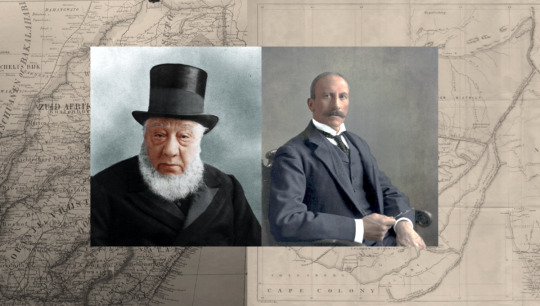
View On WordPress
#Alfred Milner#Cecil John Rhodes#Jan Smuts#Louis Botha#Paul Kruger#the 1st Anglo-Boer War#The 2nd Anglo-Boer War#The Battle of Majuba#The Boer War#The Jameson Raid#The Orange River Sovereignty#The South African Republic#The South African Union#The South African War
0 notes
Note
Hi Kiko,
I love your work, you are my favorite sim creator, you have the best hair styles for sims 4 people of color.
I wanted to know if you can make more long natural hair styles - (locs with clips/gold and silver) in different styles for the women in sims 4 :)?
like some long locs with long side bangs
some with clips
different ombre and color options
more edges
hidden scalp, or brown variation of scalps, (brown or black scalp)
I used the gif below to show a example hairstyle that looks different and cool.
-
Hair, clothes, and shoes is most important to me in sims 4.
Thank you for having this option to contact you,
Sincerely,
Nikki

I appreciate your admiration towards my artwork but this is a very disrespectful thing to ask of me. I'm not sure if this is an innocent ask, I don't see how it is because I know you've heard black people ask other cultures to not appropriate our hairstyles but I could be wrong, if this is innocent below are my boundaries, and explanations on why I (Kiko Vanity; I'm not speaking for the whole black community) I'd like to not be asked things like this in the future.
my boundaries and why
I do not make hair for people of color. People of color is a broad way to say people who are not of White/European/Anglo-Saxon phenotypes. That means people of Asian, Hispanic/Latino, African, Mixed-Race, and Aboriginal descent; and I create CC for simmers who appreciate my artwork but mainly and ideally create CC HAIRS for simmers of African descent, (including mixed race if they also have African descent) because of the lack of black hairstyles in the initial release of the game in 2014, with that, these black simmers create sims that also reflect their environments and black upbringings. I make black content if you feel comfortable downloading my content you should be comfortable saying black. I want to stress black and not African-American (despite me being African American) because there are different ethnicities for each race, including black people.
2. I am not currently taking hair requests because I'd get too many at one time and that's not great for my mental health. To piggyback off the last sentence and statement 1, please do not request my cultural hairstyles using someone who doesn't respect our wishes. You may be asking yourself, "why is this an issue? hair is hair?" (look below)
During chattel slavery, every fiber of the enslaved Africans' lives was controlled by the narcissistic people who kidnapped them. including hair, being made to cover their hair, and calling them names & degrading them for their natural hair. As the years went by and slavery ended black people but more specifically black fem presenting people held the shame for their hair. Fast forward to today, even with all the turmoil the world is facing due to greed, classism, and the patriarchy) this is the first time in history that their descendants (me being one of them) can set boundaries and say what we are comfortable with and what we are not comfortable with. And to put this as bluntly as I can:
Do not send me videos/photos/gifs of people culturally appropriating in black people's hairstyles, it's anxiety-inducing.
I'd like to also say I'm not angry because I know there is an angry black person stereotype, this is simply uncomfortable and disheartening. I hope you can respect my wishes if not please feel free to block me.
Lastly,
You don't have to respect or do anything I am saying. You may do as you wish after reading this. Just if you are going to engage with me these are my boundaries.
76 notes
·
View notes
Text
Cultural domination is doubtless a major aspect of imperialist domination as such, and 'culture' is always, therefore, a major site for resistance, but cultural contradictions within the imperialized formations tend to be so very numerous - sometimes along class lines but also in cross-class configurations, as in the case of patriarchal cultural forms or the religious modes of social authorization - that the totality of indigenous culture can hardly be posited as a unified, transparent site of anti-imperialist resistance.
The difficulties of analytic procedure which arise from such complexities of the object of analysis itself are further compounded by the verv modes of thought which are currently dominant in literary debates and which address questions of colony and empire from outside the familiar Marxist positions, often with great hostility towards and polemical caricature of those positions. First, the term 'culture is often deployed as a very amorphous category - sometimes in the Arnoldian sense of 'high' culture; sometimes in the more contemporary and very different sense of 'popular culture; in more recent inflations that latter term, taken over from Anglo-American sociologies of culture, has been greatly complicated by the equally amorphous category of 'Subaltern consciousness which arose initially in a certain avant-gardist tendency in Indian historiography but then gained currency in metropolitan theorizations as well. Meanwhile, the prior use of the term 'cultural nationalism', and of other cognate terms of this kind, in Black American literary ideologies since the mid 1960s - not to speak of the Negritude poets of Caribbean and African origins, the Celtic and nativist elements in Irish cultural nationalism, or the Harlem Renaissance in the United States - then endows the term, as it is used in American literary debates, with another very wide range of densities. Used in relation to the equally problematic category of 'Third World', 'cultural nationalism' resonates equally frequently with tradition', simply inverting the tradition/modernity binary of the modernization theorists in an indigenist direction, so that 'tradition' is said to be, for the 'Third World', always better than 'modernity', which then opens up a space for defence of the most obscurantist positions in the name of cultural nationalism. There appears to be, at the very least, a widespread implication in the ideology of cultural nationalism, as it surfaces in literary theory, that each 'nation' of the Third World' has a 'culture and a 'tradition', and that to speak from within that culture and that tradition is itself an act of anti-imperialist resistance. By contrast, the principal trajectories of Marxism as they have evolved in the imperialized formations have sought to struggle - with varying degrees of clarity or success, of course - against both the nation/ culture equation, whereby all that is indigenous becomes homogenized into a singular cultural formation which is then presumed to be necessarily superior to the capitalist culture which is identified discretely with the 'West', and the tradition/modernity binary, whereby each can be constructed in a discrete space and one or the other is adopted or discarded.
Aijaz Ahmad, In Theory
#aijaz ahmad#looking at this it’s actually ‘funny’ (you know not haha funny like chortle chortle uuuugh funny)#that I consider reading this text a personal ‘back to basics’
80 notes
·
View notes
Text
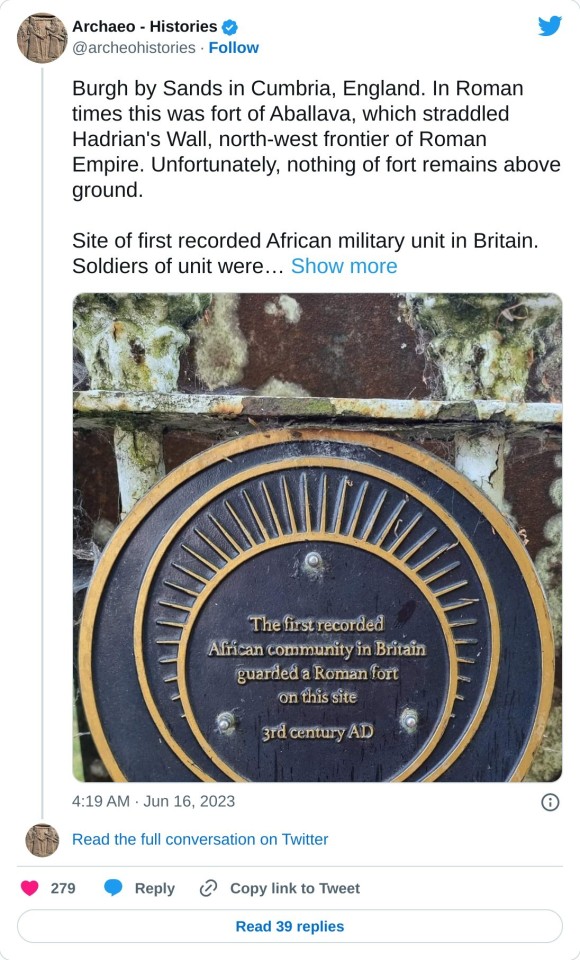
On today's episode of, "It's Only Bad When Whites Do It," we have an African "Community" in Roman Britain.
In reality, they were a unit of the occupying Roman military. But when you are trying to steal the ethnic homeland of native Brits, you call it a "community."
I guess US military forts in the Dakotas were "Anglo Communities."
339 notes
·
View notes